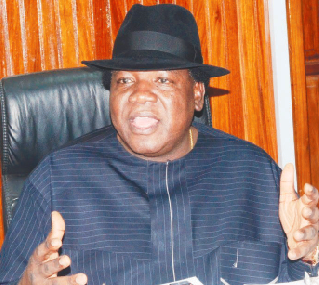Political advertisements, mostly in the print media, are not tagged like corporate ones. Practitioners fail to identify with their works, prompting feelers that those advertisements are not vetted by the Advertising Standards Panel (ASP) before exposure.
A leadership impasse in the Advertising Practitioners Council of Nigeria (APCON), which lasted 18 months, ended recently as supervising Information Minister; Edem Duke, inaugurated in Lagos the council led by SO&U Group Managing Director, Udeme Ufot.
Practitioners had protested when the federal government appointed a non-practitioner and non-fellow, Ngozi Emioma, to take over the APCON chairmanship after Lolu Akinwunmi’s tenure expired.
The leadership gap encouraged several vices in the industry, particularly during this electioneering. The biggest challenge are smear political campaigns and non-vetted advertisements in the media.
The integrity of advertising has suffered because of the delay in appointing a substantive chairman.
Political advertisements, mostly in the print media, are not tagged like corporate ones. Practitioners fail to identify with their works, prompting feelers that those advertisements are not vetted by the Advertising Standards Panel (ASP) before exposure.
Ad industry in Duke’s eyes
Duke urged APCON at the inauguration of its sixth council to uplift advertising standard especially in the current milieu where unethical political adverts flood the media space without going through the ASP.
He reiterated that APCON is the custodian of professional and responsible conduct by all persons and institutions engaged in advertising in Nigeria.
“Your code of advertising practice demands certain minimal standards of adherence to rules and regulations. I am talking about ideals of advertising practice; namely, truth, honesty, decency and legality. This is in addition to respect for Nigeria’s cultural values and our national icons.
“I charge you today to apply yourselves to the unwavering discharge of these responsibilities with the resolve to lift the standard of advertising practice in Nigeria and accord the profession the level of respectability it deserves,” Duke said.
He criticised practitioners for engaging in unethical behaviour, sharp practices, and unbridled pursuit of money, which add up to devalue the system.
He reminded APCON that it is mandatory for it to adhere to the responsibilities in the contracts with media houses and other groups.
“We can start today, at this inauguration of the sixth governing council, to do things differently.
“We can resolve to rebuild and sustain a profession where our attachment to integrity and credibility should improve the perception of the profession and the industry generally.”
Akinwunmi’s verdict
Akinwunmi disclosed that though some practitioners fail to vet their advert materials, compliance level has increased from 70 per cent to over 75 per cent.
He urged the new council to continue the reform gazetted by the government.
He recalled that during his tenure, the council reviewed the Fifth Code after wide consultation through the APCON Committee on Advertising Practice Reforms (ACAPR).
“We added over 1,000 new members through students’ registration, over 1,000 Associate Members, over 100 upgrades from Associate membership and several Fellowship Awards,” Akinwunmi added.
He said the council also worked with the National Institute of Marketing of Nigeria (NIMN) to streamline membership registration, and signed a memorandum of association to seal it.
Foreign agencies
The Fifth Code has been criticised by industry stakeholders for its protectionist tendency. Some laud the code, which seeks to proper regulations of the entry of foreign business, others condemn it as protectionist.
Akinwunmi reminded practitioners and the new council that with the gazetting of the Fifth Code and the setting up of the machinery for licensing, APCON has a major role to play in ensuring adherence to the law.
“The new regime is not in place to stop foreign players or discourage them.” On the other hand, he stressed, “the purpose is to ensure that adequate and proper regulations are in place to ensure the sector operates professionally.
“We are aware of some illicit and unauthorised activities at the moment, whereby some foreigners are operating illegally within the market, simply because there is no council in place.
“My expectation is that the new council will move rapidly to stop and also discourage such activities.”
Ufot’s position
Ufot stressed the need to strengthen enforcement by giving full legal backing to the Advertising Practitioners Investigation Panel (APIP) and the Advertising Practitioners Disciplinary Committee (APDC).
“Membership of these committees may need to be restructured to entrench the principle of fair hearing. This will enable the removal of some of the prosecution hiccups.
“Having been in limbo for almost 18 months, a lot of work needs to be done to get APCON back to effectively playing its regulatory role,” Ufot said.
He sought the acquisition of appropriate technology to enhance monitoring the media space across Nigeria, but stressed that “all of these and more will require adequate funding from APCON.”
He urged the sectoral groups to work for the growth of the industry and cautioned against unprofessional activities.
“APCON can only be as strong as the industry it regulates. The stronger, more viable and professional the sectoral groups are, the stronger the industry will be, and so also APCON.”














